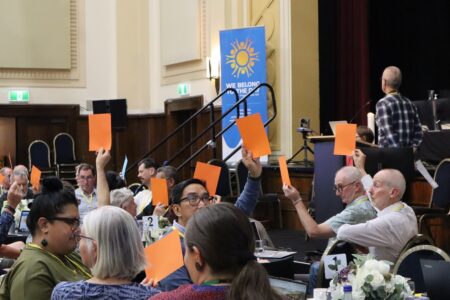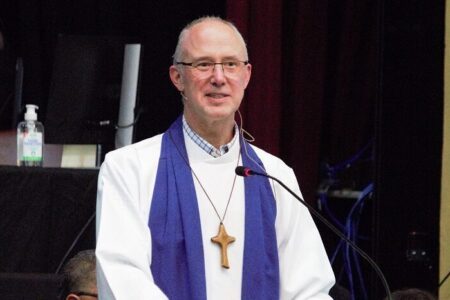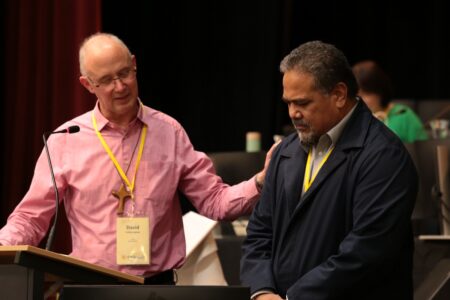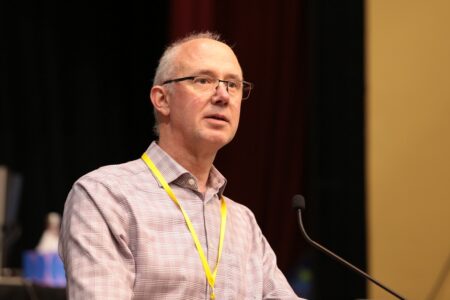By Andrew Humphries
Robust discussion exploring important proposals in great detail was an important part of day three of Synod 2023 today.
A proposal relating to reducing the harm of prohibited drugs as part of a move towards a health-based approach, one moving towards zero emissions, and another on secure work were explored today by Synod members.
One of the more complex proposals was brought by Uniting Vic.Tas around support and advocacy for the decriminalisation of possession, and personal use, of small amounts of illicit drugs, as part of a health-based approach to the issue of drug use.
Rev Alistair Macrae put forward the proposal on Sunday on behalf of Uniting, noting that “the fundamental objective of drug policy should be to keep people safe and reduce the harm of use”.
“Care for the vulnerable is care for Jesus,” Alistair said in introducing the proposal.
In speaking to the proposal on Sunday, General Manager of Alcohol and other Drugs and Mental Health and Carers at Uniting Vic.Tas, Adrian Webber, said it was important to recognise the harm and stigma which criminalisation caused to people carrying drugs only for their personal use.
“Uniting Vic.Tas as a community services organisation has a long history of working to reduce alcohol and other drug-related harm, improve health and wellbeing and advocate for evidence-based and socially just drug policy,” he said.
“Drug policy profoundly impacts the lives of people who use alcohol and other drugs, and those dependent on substances.
“Criminal penalties for personal drug use add to the potential health and cause further harm, disproportionately impacting people who are already marginalised.”
Following further discussion this afternoon and again this evening, and with some amendments to the original proposal, it was agreed by consensus:
That the Synod resolves:
Recognising that substance abuse may cause enormous harm to individuals, families and communities and that the Church discourages use of illicit drugs, the Synod resolves:
a) To call upon the Victorian and Tasmanian Governments to foster an open dialogue with the community on the most effective strategies to reduce the harm of illicit drugs.
b) To affirm that alcohol and other drug-related policy in Victoria and Tasmania should reflect the following principles:
i) Dependency on illicit drugs is the result of complex interplay between psychosocial, developmental and environmental factors requiring a health and social response;
ii) The fundamental objective of drug policy should be to keep people safe and reduce the harm of use and provide pathways to wellness;
iii) While law enforcement actions to disrupt large scale supply of illicit drugs remain essential, drug possession for personal use should not be a crime and individual drug users should not be subjected to the criminal justice system for personal use;
iv) Policies should not stigmatise, marginalise or punish drug users;
v) Drug policy and treatment should reflect the best available evidence and resources should be allocated towards measures that are most effective.
c) To support and actively advocate for greater funding in demand reduction and harm reduction strategies including specialist alcohol and other drug treatment and harm reduction services to support people who use drugs, and to address harm to families and communities associated with illicit drug use, and to support and advocate for the decriminalisation of possession and personal use of small amounts of illicit drugs
d) To write to the Premiers, Opposition Leaders, Attorneys General, Ministers for Health as well as Shadow Attorneys General and Ministers for Health in Victoria and Tasmania; to inform them of this resolution.
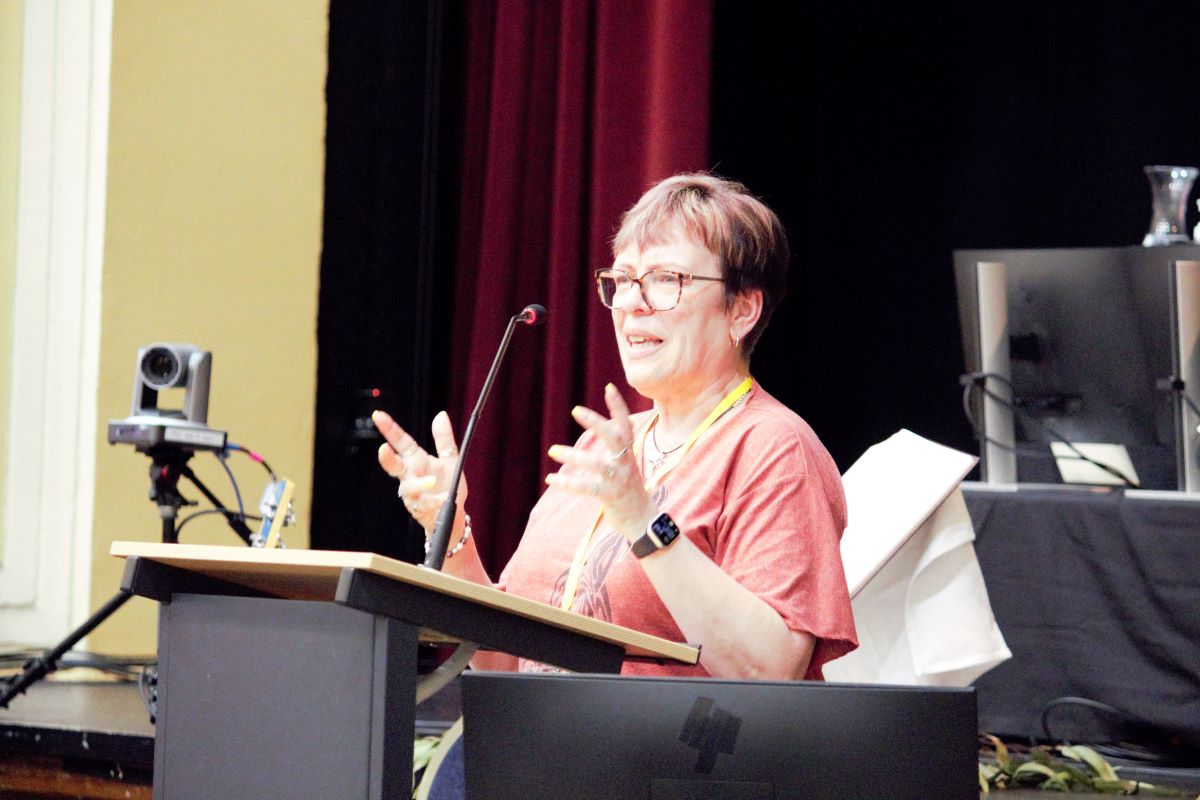
Rev Jay Robinson responds today following a minute of appreciation for her service with the Placements Committee.
A proposal which was carried this evening asked the Synod to support the concept of secure work, as part of support for greater equality for workers everywhere.
Today’s resolution confirms Synod support for reasonable additional measures in law and practice to create gender equity and eliminate sexual harassment in the workplace, and to advocate that people doing the same work at the same level for the same employer are paid the same and are given equivalent conditions.
The resolution also calls on the Federal and State governments to ensure the on-demand gig economy is not used by unethical employers to classify employees as independent contractors, and to seek an amendment to the existing law to establish collective bargaining rights for all people engaged in work through the gig economy.
A proposal further considered today aims to address the issue of climate change, with all parts of the Uniting Church in Victoria and Tasmania, its members, institutions and councils urged to aim for zero emissions by 2040.
The setting up of a Synod Emissions Reduction Fund is also suggested, with funds to be administered by the Synod Climate Action Taskforce.
The proposal was discussed at this evening’s session and will be considered further tomorrow on the final day of Synod 2023.
During today’s afternoon session, a minute of appreciation was offered for Rev Jay Robinson for her leadership on the Synod Placements Committee.
Jay served as chairperson from January 1, 2022 to October 31 this year and as deputy chair from November 26, 2019 to December 31, 2021.
“Jay brought to the Placements Committee her boundless energy, enthusiasm and warmth, her wonderful smile and pastoral heart, her considerable gifts and abilities, and a generosity of spirit,” proposer Fee Morrison outlined in the minute of appreciation.
“Her warm nature welcomed members and guests alike to meetings in ways that ensured both deep sharing and structured processes were comfortable and engaging.”
During the afternoon, the Synod paused in recognition of International Trans Day of Remembrance and prayed for all gender-diverse people who had ever suffered discrimination and rejection.
This was followed by an invitation for Synod members to volunteer to march behind a Uniting Church banner in next year’s Midsummer Festival.
Recordings of most of today’s plenary sessions are available on the Synod 2023 YouTube channel.


